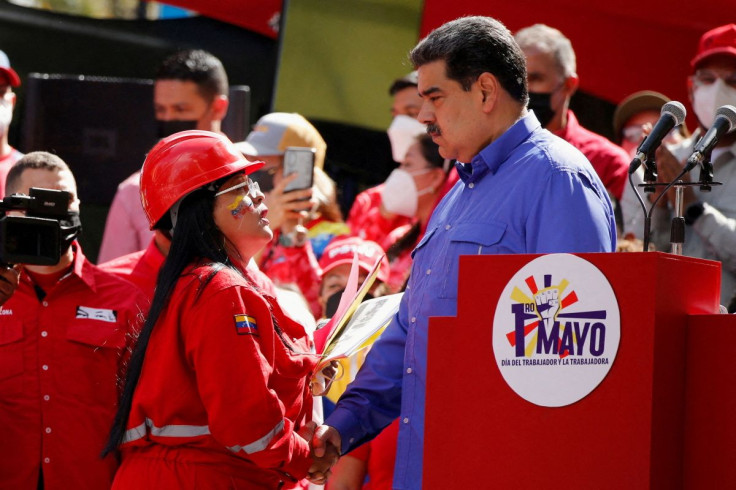Talks Between Venezuela's Maduro, Opposition Expected As U.S. Eases Some Sanctions -sources

Venezuelan President Nicolas Maduro and the country's opposition were expected to announce a resumption of talks as Washington eases some sanctions to help smooth the way for the negotiations, according to U.S. officials and others familiar with the matter.
As part of the U.S. approach, President Joe Biden's administration was set to authorize U.S. oil company Chevron Corp to open talks of its own with Maduro's government, temporarily lifting a U.S. ban on such discussions, senior administration officials said.
However, there is no final U.S. decision yet on renewing Chevron's current limited license to operate in Venezuela, several sources told Reuters. Chevron is the last U.S. oil producer to maintain a presence in Venezuela, home to the world's largest crude reserves.
Washington was also poised to remove Erik Malpica, a former official of state oil company PDVSA and the nephew of Venezuela's first lady, Cilia Flores, from a U.S. sanctions list, one U.S. official told Reuters on condition of anonymity.
The moves, which U.S. officials said were decided in consultation with the opposition, follow a visit to Caracas in March by the highest-ranking U.S. delegation in years, leading to the release of two U.S. detainees.
It was widely seen as a goodwill gesture by Maduro, who is under heavy U.S. sanctions along with his inner circle.
Maduro also expressed a willingness to return to negotiations in Mexico with the opposition, which he abandoned in October, and sources said the two sides on Tuesday were expected to set a date for resuming talks.
The talks are aimed at resolving Venezuela's long-running political crisis, and Washington insists that any major lifting of sanctions will depend on progress at the table. The United States has recognized opposition leader Juan Guaido as legitimate president, condemning Maduro's 2018 re-election as a sham. But Maduro remains in power.
The decision to allow contacts between Chevron and PDVSA - the centerpiece of Venezuela's U.S.-sanctioned oil sector - has "guardrails" to prevent going beyond what was authorized and was made in consultation with the opposition, one of the officials said.
The latest U.S. moves, including the Chevron decision, were intended to help encourage the renewed Mexico talks, and the steps are contingent on Maduro's government acting "constructively" in negotiations, officials said.
"It does not allow (Chevron) entry into any agreement with PDVSA or any other activity involving PDVSA," a senior administration official told reporters. "So fundamentally what they're doing is just allowed to talk."
Despite that, Senator Robert Menendez, chairman of the Senate Foreign Relations Committee and Biden's fellow Democrat, said in statement: "The Biden administration must refrain from lifting any additional sanctions until Maduro makes concrete concessions at the negotiating table."
The senior administration official said the United States was "undertaking a number of measures" at the request of the Venezuela opposition "to support their decision to return to the negotiating table in Mexico City."
The official said sanctions relief would be calibrated in line with "ambitious, concrete and irreversible outcomes" in negotiations and warned that U.S. steps could be reversed if there was any backsliding by Maduro's government.
© Copyright Thomson Reuters 2024. All rights reserved.











